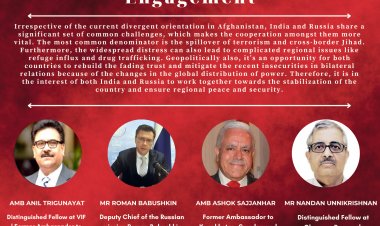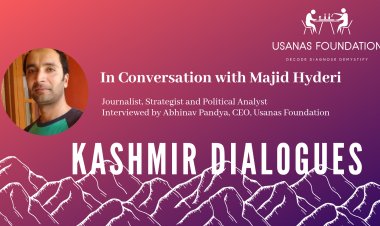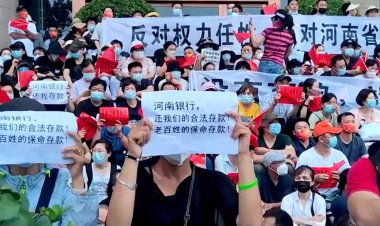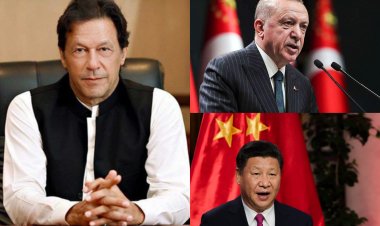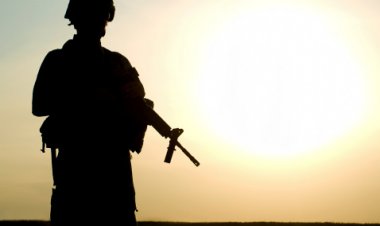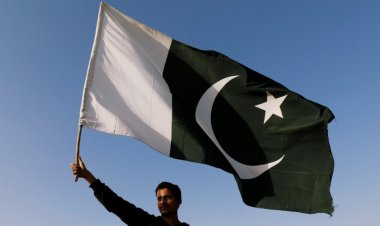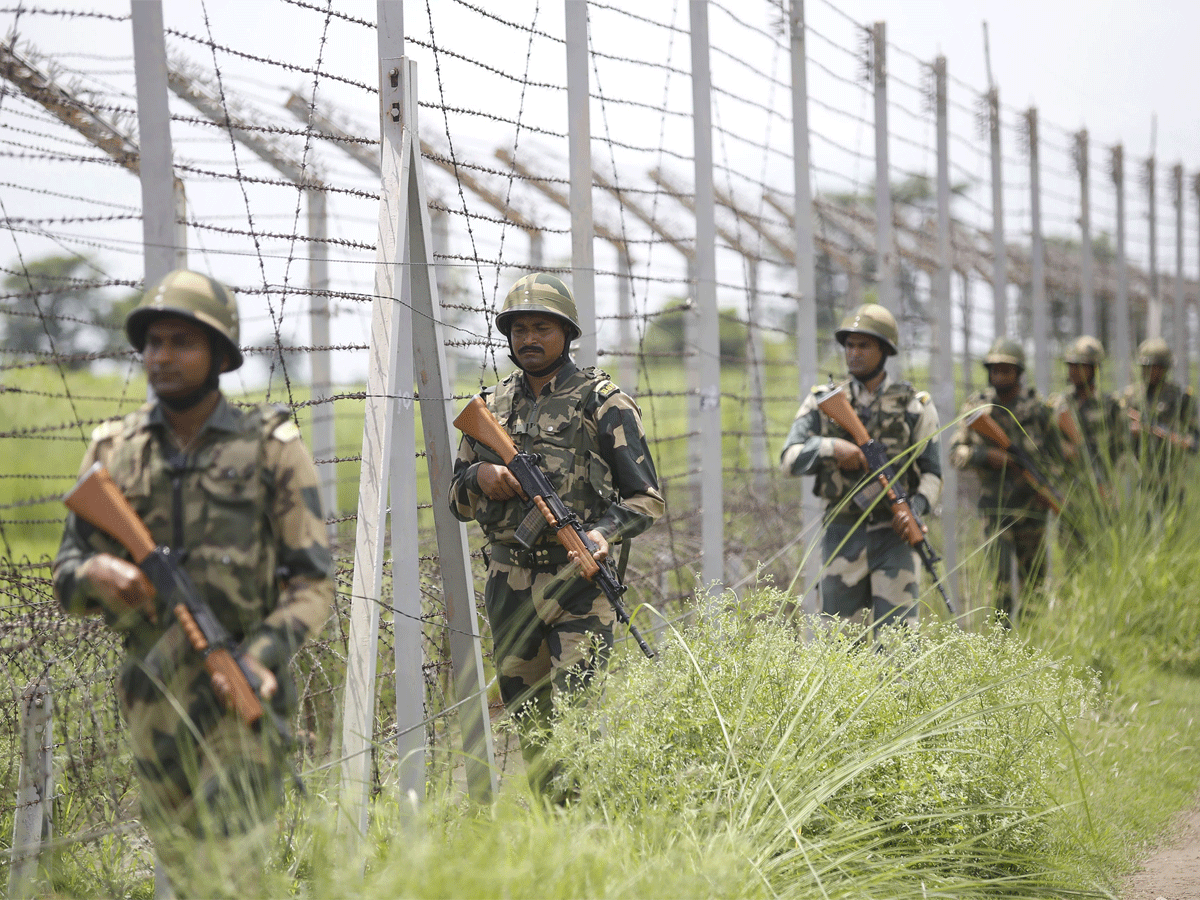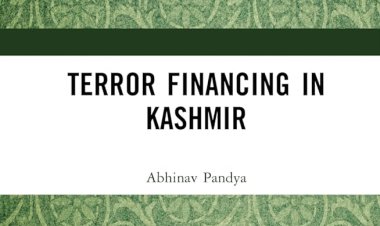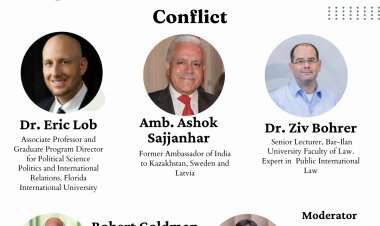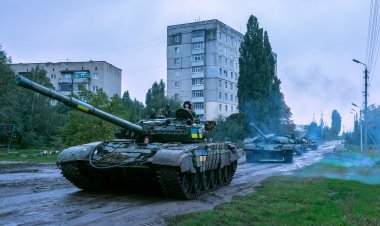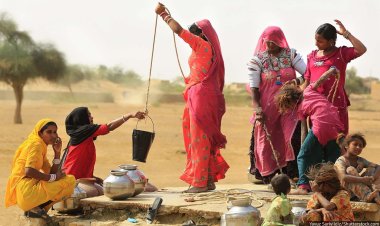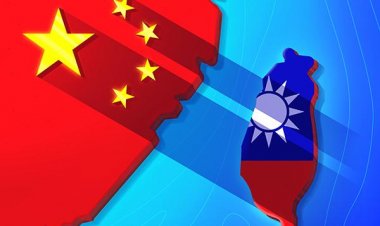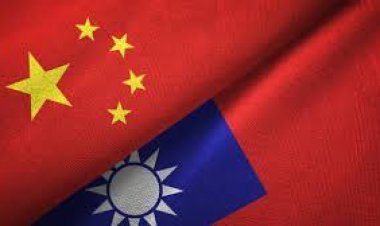Pakistan’s Invasion of Kashmir (22nd Oct. 1947): Darkest Hour in the History of Jammu and Kashmir
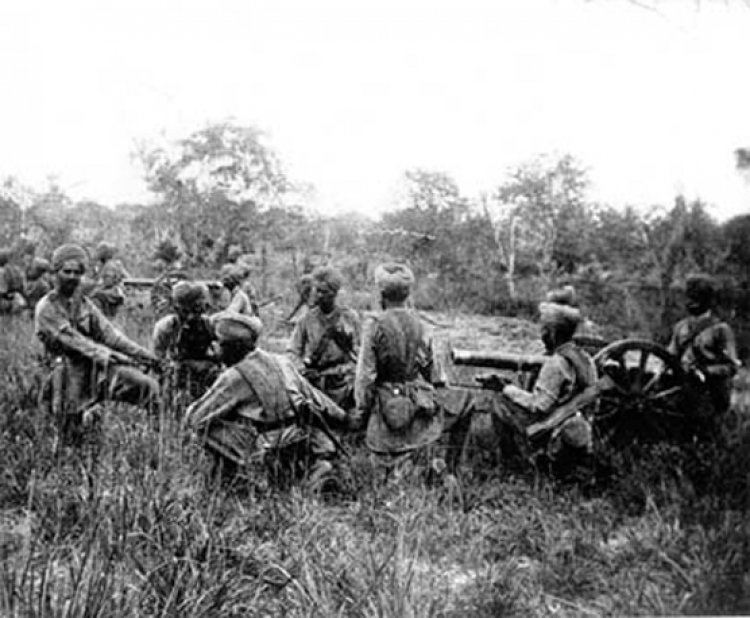
Webinar Report
By Usanas Foundation
A webinar on 'Pakistan’s Invasion of Kashmir 22nd Oct. 1947): Darkest Hour in the History of Jammu and Kashmir' was organised by Usanas Foundation, Udaipur-based geopolitical affairs think-tank, focusing on the Pakistan backed tribal invasion of Jammu and Kashmir, beginning from 22nd October. The speakers during the seminar focused on the false narrative that has been propagated surrounding the events following the invasion and how people around the world still unfortunately believe the false narrative spread by Pakistan in order to make itself look like a messiah while in reality they were ‘murderers’. The speakers also delve into the current situation in Jammu and Kashmir.
The Speakers of the event were: Lt. General Ata Hasnain, Professor Amitabh Mattoo,Kashmiri politician Mir Junaid, C.D. Sahay and Deputy Director of the Woodrow Wilson centers Asia Programme Michael Kugelman. The event was moderated by Abhinav Pandya, CEO of the Usanas Foundation.
Moderator- Raiders from Pakistan continue to infiltrate into Kashmir and attempt to perpetrate untold violence. Today’s discussion will be centered around the Pakistan backed Kabaili tribal invasion of Kashmir on 22nd October 1947 which is regarded as one pf the darkest time in the history of the valley.
Lt. General Ata Hasnain- The story of Kashmir needs to be retold. Today I will try and shed light on what is actually the black day because for years Pakistan has tried to propagate a false narrative and claim that the black day is actually on the 26th of October when the instrument of Accession was signed by the Maharaja of Kashmir. There are similar unflattering labels attributed to 27th of October as well. India is a rather innocent nation, honest and truthful and like to tell things as we see things, but often times we fail to realize that our neighbors that those around us are not like us. The falsely create narratives that suit them and their situation. Due to this, for the last 70 years, the international community has only heard false narratives regarding the events of 22nd October 1947 and India has willingly or unwillingly been unable to correct that perception. India has believed that the events that happened on 22nd and the days following that were something of history. As these false narratives were not addressed during the initial phase, they have become deeply engrained withing the international community. The narrative that has been created is that Kashmir is a Muslim majority region and therefore belongs in Pakistan because it is an Islamic nation. Another false narrative is that India used force and coercion to force the Maharaja to sign the instrument of Accession and then in order to make it look legitimate moved in its troops on the 27th. They further state that India forcefully took over Kashmir and that is why that part of Kashmir is ‘illegitimately’ with India.
From 1948-72 Pakistan has tried to use force to capture Kashmir by force and despite that they have claimed that that were the first ones to implement the United Nation resolution regarding Kashmir. History has overtaken the UN resolution of 1948-49 because Pakistan has tried to change the narrative by force. While many countries around the world, especially India’s allies believe the narrative put forward by India, any people around the world do not believe in that narrative. That is why much more comprehensive attempt must be made to show the world the true narrative of what happened on 22nd October 1947.
In actuality this event does not start on 22nd October, it actually began much before. General Akbar Khan in his book ‘Raiders of Kashmir’, stated that preparation and an underlying understanding that there would be conflict in Kashmir was made back in June and possibly even before that. The preparation for the events of 22nd were already being made much before the actual invasion. Th territory of Jammu & Kashmir was of great strategic importance to both India and Pakistan due to its location, connect to Central Asia and China. That is why Pakistan in no way could afford to lose control of Kashmir irrespective of the fact whether it was a Hindu majority region of a Muslim majority region. In addition, Pakistan was also keenly aware that after partition it did not have a standing army and that it would take time to create and establish one, on the other hand India had retained the remnants of the British Indian Army. In order to overcome this barrier, Pakistan decided to harness the existing resources of the Tribals and struck a deal with them. This move by Pakistan took India completely by surprise. As per General Akbar’s book, several Lashkar’s were to advance on strategic roads leading to Srinagar and would enter and block the Banihal pass so as to block India’s access to Kashmir. Multiple other Laskar’s were also deployed on several other strategic locations. Pakistan’s 7th Infantry Division at this time was also kept in reserve and was meant to exploit any early gains that were made by the tribal forces. Pakistan’s plan was highly professional and was coordinated. The tribal used pillage, plunder and rape as a tactic/ instrument in their offensive. The very people that Pakistan claimed to save and protect were subjected to untold horrors and violence. This fact is hardly spoken about and recorded. The rape and plunder of nuns at a convent and the heroic patriotism of Maqbool Shervani is hardly talked about today. The Maharaja’s small number of troops put forwards a valiant effort to fight the tribal invaders but faced with dismal odds the Maharaja took the decision to sign the instrument of Accession and then Indian Forces were brought in on 27th of October. After several great battles, a ceasefire was finally reached after a year. Many people question behind the reasoning behind the ceasefire, many believe that all of Kashmir should have been taken.
Pakistan committed tremendous atrocities on the people they claimed to have wanted to save. A set of lies has been told to people and many people unfortunately believe this lie.
Professor Amitabh Mattoo- We will try to delve deeper into the aspect of civilian resistance to the Kabali tribal raid of Kashmir that was aided and supported by Pakistan. Before the Indian Army landed in Kashmir, volunteers from the Kashmiri civil society passionately, voluntarily and devoid of materialistic incentive trained themselves in the use of firearms in order to resist the invading tribals. Men, women and even teenagers took up arms against the Pakistan aided invaders. This civil resistance prevented an onslaught on Srinagar, in the absence of these patriotic fighters, Srinagar would have suffered much greater damage on par with other regions of Kashmir. ‘Hamlavar Khabardar, hum Kasmeri hai Taiyar’, Kadam Kadam Bharenge Hum, Mahhaz pe larenge hum’- slogans used by Kashmiri’s during the tribal invasion. Kashmiris led by Kashmiris from all classes and faiths took up arms to defend the region. Many of those who fought and died, including 19-year-old Maqbool Sherwani remain unsung. The residency road in Srinagar was once upon a time know after Sherwani but is no longer referred to as such but is referred to as the ‘British residency’ road. Sherwani’s life and legacy, as well as his ideals must be mainstreamed throughout the country. Every part of India should carry a chapter on the life of Maqbool Sherwani because this is the history that everyone in India should grow up with, the frontline of resistance against the Pakistani tribal invaders were Kashmiris. Sherwani, through guile, false rumors and Kashmiri charm managed to singlehandedly delay the Pakistani backed tribals.
Due to his actions he was tortured and crucified. Before the invasion, Shervani even disrupted Jinnah’s speech in Srinagar before the invasion. As per eye witness accounts, Sherwani before his death cried out ‘victory for the unity of Sikhs, Hindus and Muslims’. Mahatma Gandhi has also referred to Sherwani and stated that his martyrdom would make anyone proud. His legend and story is unfortunately forgotten, his ideals closely represented those of India. It’s important that that the tales and actions of Local heroes who resisted the Pakistan backed tribals be part of any narrative that India decides to push forward in order to show that the Kashmiris themselves were the first to take up arms against the invaders.
What does Sherwani represent- 1 His Individual bravery coupled with his ingenuity. 2 His ideas were rooted in the inclusiveness of Kashmiris and had also vehemently opposed the two-nation theory. 3 He represented the idea of an egalitarian, humane, non-feudal and democratic Kashmir that Prime Minister Modi today talks about. 22nd was a dark day because Pakistan sent tribals into Kashmir, but what we need to do now is that we recognize unsung Kashmiris and remember their sacrifice. We must do away with the false narrative that has been spread by Pakistan and its allies and show the world the truth.
Kashmiri politician Mir Junaid- Many in the younger generations have forgotten the truth of the events that transpired on 22nd October 1947, therefore discussions such as these are extremely important of that the current disputes in Kashmir can be put in a historical context. The previous generation of Kashmiris has been destroyed by the false narrative/idea of Azadi that was propagated by Pakistan. The educated section of J&K seems to have turned a blind eye towards the history of J&K. The current generation are a product that was not only a victim to the poisonous narrative spread by Pakistan, this narrative has also destroyed the harmonious nature of the valley.
Kashmir was something that Jinnah thought was already in his pocket, but things did not turn out this was as the politics in Kashmir increasingly demanded democracy from the monarch. While the majority of the population was Muslim, the essence of the society was multi-cultural in its core and due to this multi-cultural nature, J&K was naturally suited to join India instead of Pakistan that had already declared itself as an Islamic country. J&K saw a future in the democratic India and if things had progressed naturally, J&K would have joined India. The Tribal attack on Kashmir on 22nd October was something that Pakistan did not want to be formally linked too because they would have faced backlash from world powers for its brutal and uncivilized behavior.
The main point of interest is not the Accession of Kashmir by India, but the invasion of Kashmir by Pakistan backed tribals. People in India seem to have forgotten the history of Kashmir and Pakistan has been able to use this ignorance to change its image from a murderer to a messiah. The horrors caused by Pakistan on 22nd Oct 1947 has been erased from the minds of Kashmiris that have been used as proxies by Pakistan. Pakistan’s purpose from its inception has been the destruction of India. Pakistan has used these proxies in order to conduct on of the most brutal insurgencies in the world. It has stripped Kashmiris of its multi-cultural identity and the most brutal mass exodus in Kashmir took place by the order of Pakistan to its proxies, this has led to the social isolation of Kashmiri Muslims and the generation born after are totally unaware of the true multi-cultural identity of Kashmir. One of another contributing factor is Article 370, the people of Kashmir have been made to believe that Article 370 is a protection of Kashmiri identity but these are wrong and Kashmiri identity is not superior to the identity of being an Indian. All Article 370 has done is enable corruption and limit the corridors of power to their own selves. The grants that had been provided to J&K by the central government have only been used to create hollow institutions which could not create confidence in the people. The political mafia on one side communally charges the people of Kashmir and on the other hand continues to ask for more money from the center.
Abhinav Pandya- Q: How do you see the way forward for Kashmir, irrespective of the Pakistani narrative?
Answer: The only way forward for Jammu and Kashmir now is to transform Jammu and Kashmir into a world-renowned socio-economic environment.
Abhinav-Q: The real assault of Kashmiri identity in the valley is the deep entrenchment of religious extremism. Why do not more Kashmiris speak out against the actions of Pakistan and why do they not speak out?
Answer: Pakistan has been continuously intoxicating the minds of Kashmiris. If a normal student or common Kashmiri with no political backing wishes to take part in the democratic process of speak out, he/she immediately begins fearing for their life. The government needs to ensure a safe and stable environment and only then will they be able to speak out. Religious extremists in Kashmir do not want democracy to succeed because violence in Kashmir fulfils their global agenda.
Michael Kugelman (Deputy Director of the Woodrow Wilson centers Asia Programme)
Question: Why do people in the US question India about alleged Human Rights violation in Kashmir, but then do not question Pakistan’s occupation and annexation of Kashmir.
Answer: Very few people in the US, whether they be policy makers or academia wish to get bogged down by the history of the Kashmiri issue, the US administration only cares about the current situation. There has been a myth that US policy towards the Kashmir issue has changed during the Trump years, this is largely because of some comments he has made such as offering to mediate talks between India and Pakistan. But that was not a true offer of mediation and the US policy has not changed.
After August 5 last year there have been some criticisms originating from Democrats on Capitol hill regarding the revocation of Article 370 and its aftermath. The criticisms did not address the removal of Article 370 but was more concerned with the aftermath and the media blackout that followed. The criticism focused on Human Rights in the aftermath. The incoming Biden administration may be more willing to talk about the Kashmir issue privately but the issue will not be a high priority. There has been very little said by the Biden-Harris camp about the Kashmir. All references made by the Biden-Harris camp have been attempts to garner votes at home before the election rather that concrete promises of action. Biden will enter the White House with the same goal as past presidents, to pursue strategic- security partnership with India. There is also bi-partisan support for this partnership. Therefore, it is unlikely that Biden will risk that relationship by bringing up the topic of Kashmir.
The only way that Kashmir is currently seen by the US is as a stability issue, Kashmir has been the spark of multiple wars between India and Pakistan. Kashmir will not be a big priority and the incoming administration will more likely focus on domestic problems such as the ongoing pandemic and socio-economic troubles.
Q- Will the US continue to ignore Pakistan’s continued export of terrorists? In the event of another Pulwama style attack, India may choose to retaliate with greater force, what will be the US’s reaction then.
Answer: Terrorism will be a big issue for Biden personally. Biden sees India-US relationship above all as a counter-terrorism partnership and countering China is a secondary aspect. This importance to terrorism given by Biden suggests that Biden taking a harder stance against Pakistan when it comes to India or Kashmir centric extremists. In the event of a Pulwama 2.0, the US administration would be fully behind India. But US is unlikely take too hard a stance against Pakistan because of the ongoing Afghan peace deal will require some dialogue with Pakistan.
Moderator- Currently India has a strong legal case stating that Kashmir belongs to India and that Pakistan is illegally occupying part of it. Therefore, is now the perfect time to take the issue global and international forums?
Answer- Ata Hasnain: Only one thing currently holds India back from taking the Kashmir issue global, taking the issue global would in some way play into Pakistan’s hands. Because Pakistan considers Kashmir a UN issue and India has through the Shimla agreement has stated that the Kashmir issue is a bi-lateral issue and that the issue has to be mutually resolved. There has to be a comprehensive strategy that will not creates problems for India in the future.
Professor Amitabh Mattoo- The answer to this question lies in what India wants to be, does India want to be seen as a major world power. While it is good idea to continue to pressure Pakistan in forums such as the global forum of money laundering and terrorism funding, spending the country’s diplomatic resources will only bring back marginal returns and would be infinitely better served tackling other global challenges. Many world powers are becoming aware that India is putting too much of its resources into dealing with a country like Pakistan and that if India wants to play a role as a major world power then it must begin to tackle other global issues. It would be counter-productive to take on Pakistan in the global sphere and those resources would be much better spent protecting India’s economic interests abroad. It would also better if the US hears India diplomats speak about climate change and global issues rather than Pakistan.
Michael Kugelman- There will be no complaints if India tries to play a more significant global role. The US is more interested in the stability of the region. One goal of the Biden administration would be to not only increase cooperation with India in a bilateral setting but also in a multilateral setting by working together in multiple forums.
Disclaimer: The opinions expressed in the webinar belong to the panellists and not necessarily to the Usanas Foundation.

